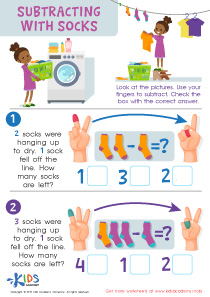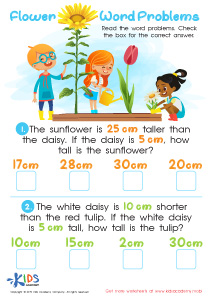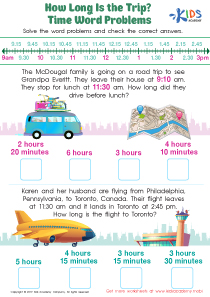Logical Reasoning Two-step Word Problems Worksheets for Ages 3-7
3 filtered results
-
From - To
Looking to boost your child's problem-solving skills? Our Logical Reasoning Two-step Word Problems Worksheets for ages 3-7 are designed to challenge young minds while making learning fun! These engaging worksheets help children develop crucial logical reasoning abilities and practice effective problem-solving techniques through simple yet intriguing two-step word problems. Perfect for early graders, this resource enhances critical thinking, comprehension, and arithmetic skills. Featuring vibrant illustrations and relatable scenarios, our worksheets are crafted to keep children interested and motivated. Download today for a comprehensive learning adventure tailored to build confidence and a love for math.


Enrichment -2 Step Word Problems Worksheet


Solve the Problem: Trick–or–treating Worksheet


Addition and Subtraction: Word Problems Worksheet
Logical Reasoning Two-step Word Problems are crucial for young children ages 3-7 as they lay a foundational skill set that is indispensable for their overall cognitive development. Solving these problems encourages children to think critically and sequentially, enhancing their problem-solving abilities. At this formative stage, children are particularly receptive to learning new concepts, and engaging them with word problems helps to build their understanding of how to break down complex tasks into manageable steps.
Furthermore, these activities bolster children's arithmetic skills, as they often involve basic operations like addition, subtraction, multiplication, and division. By integrating logical reasoning with mathematics, children can see the practical application of the numeracy they learn in class, making the subject more interesting and relevant to their everyday lives.
Parents and teachers should also care because these exercises foster perseverance and patience. Children learn to work through problems gradually instead of expecting immediate answers. This mindset is valuable not only in academia but also in life as general problem-solving needs arise.
Finally, incorporating logical reasoning into early education promotes the development of crucial soft skills like attention to detail, analytical thinking, and improved comprehension. These skills collectively prepare children to tackle more complex academic subjects and everyday challenges confidently in the future.
 Assign to My Students
Assign to My Students











